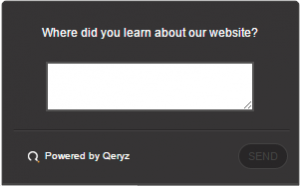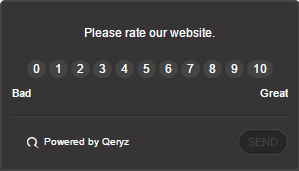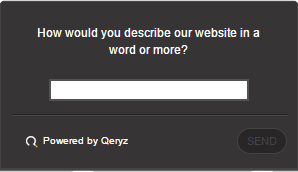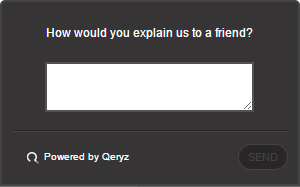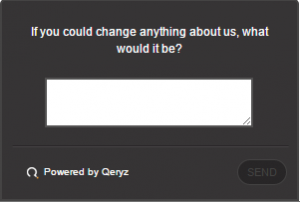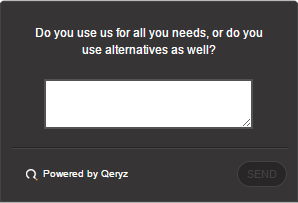10 Effective Questions to Try on Your Next Customer Survey
Google Analytics can do a lot, but it can’t do everything.
While it’s undoubtedly a reliable source of data with regards to user behaviour, sometimes a little extra insight is needed.
That’s where online survey tools like Qeryz come in. They’re easy to set up and its effects are huge – the in-depth data it provides will allow you to see your website (or product) from a wholly different perspective. However, the only way to gain that perspective is to ask the proper questions.
This is where it gets a little tricky. Online surveys will only work if they’re done properly– they have to be short enough that users won’t feel bogged down as they go while also long enough that it asks all the questions it needs to. That means that the questions you use have to be meticulously planned out.
If you find yourself wanting to set up an online survey on your website but you’re at a loss on what to ask, consider the following questions and cherry pick the ones you think applies to you and your site the most:
Briefly describe yourself.
This is a great opener. Not only will it kick-start their engagement – everyone loves to talk about themselves after all – but it’ll also allow you to profile your data according to the people who’re answering them. This may even allow you to identify industry trends by analysing your demographics!
Where did you learn about our website?
Finding out your sources is an integral step into identifying other possibly unknown markets. Who knows, there may be a niche out there you don’t know about.
Please rate our website.
You can use whatever rating you feel would be best, but the recommended is the standard x out of 10. Out of 3 or 5 is also okay, but allowing them to give a rating out of ten allots them more flexibility. Asking them why they gave that rating wouldn’t hurt, either.
Would you recommend our website to a friend?
This is one of the best ways to see what users think of your website. After all, people naturally wouldn’t recommend something to their friends if they don’t think it’s worth it themselves. Try not to make it a simple yes/no question and instead ask for a short explanation as to why they answered the way they did.
Alternatively, you can ask them to rate your website first before asking them if they’d recommend you to a friend. This type of question will yield you your Net Promoter Score (NPS), and the higher it is, the more likely you will experience positive growth.
How would you describe our website in a word or more?
Never underestimate the power of word association as a one-word description can be just as good as a full-blown essay. For this question you may allow your user to list their own words or alternatively, you can let them choose from a set. I recommend Microsoft’s production reaction cards. To assist in its analysis, use word clouds to help identify the most prominently used words.
How would you explain us to a friend?
Ask your users to describe your website or product as you would to others. This will allow you to see what kind of words your users might unconsciously associate with you, thus giving you insight on how they may feel about you.
If you could change anything about us, what would it be?
The undisputed best way to find the chinks in your armour is to ask those who use it. Ask your users directly if there’s anything that they’d like to overhaul – even if it’s something seemingly small. Minute changes may have profound effects; even something as simple as changing a button design or optimizing old posts help. A lot.
Do you use us for all you needs, or do you use alternatives as well?
Should your user affirm that they’re also using alternatives, revealing which ones and why they do so will prove invaluable. Not only will it point out what features you lack or what you could improve, but it also shows what kind of user experience they’re looking for. Compare yourself to the ones they mention and find out if there’s anything they do better. After that, seek improvement!
What is the purpose of your visit today?
By analysing Google Analytics you can come to this conclusion on your own, but hearing it straight from your users will ensure that you know the reason for sure. Also, knowing what purpose you serve to your users will clarify your role and thus allow you to build on it.
Which of our features can you not live without?
Knowing your own strengths is just as important as knowing your weaknesses. Instead of concentrating all your efforts on trying to enhance your blind spots, why not capitalize on your winning areas too? It all boils down to simply making sure you’re good at what you offer. Otherwise, your users will simply jump to your competitors who offer the same thing.
The above questions are guaranteed to get a reaction out of your users. But, if you feel like none of them fit you and you want to try your hand at generating your own questions, here are some general tips to keep in mind:
KISS (Keep It Simple, Stupid!)
It’s just as the header says. Make your surveys as simple as possible. No one will take the time to answer questions laden with jargon they’ll have to look up; use normal words to ensure that everyone can participate should they wish to.
Balance, Not Bias
Ensure that the questions you use have no bias towards any one thing. Abstain from using adjectives and keep your questions as neutral as possible. You don’t want to influence your users’ answers.
Speak to Them
As much as possible address your users as directly as you can. Avoid beating around the bush, too – just get to the point.
Writing customer survey questions is relatively simple so long as you know what you’re doing. As long as you integrate the questions above or follow the aforementioned tips, you should have no problem getting information from your users.

